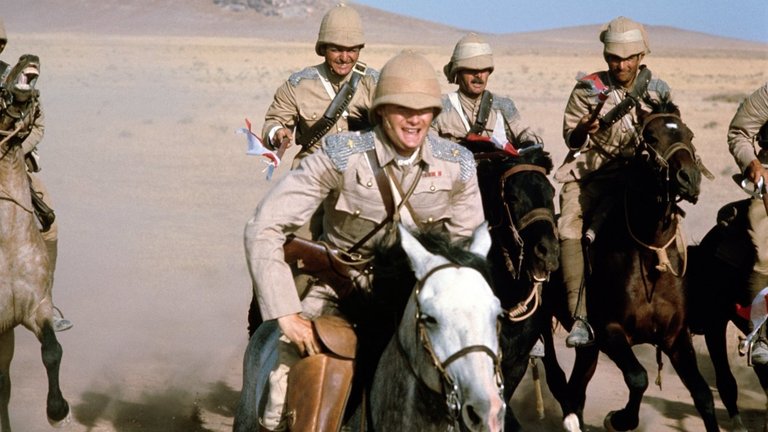Film Review: Young Winston (1972)

The recent geopolitical crises that have thrust Winston Churchill’s legacy back into the spotlight—his image invoked as a symbol of resolute leadership and moral clarity—underscore the enduring mystique of one of the 20th century’s most compelling figures. Revered as the “saviour of Western civilisation,” Churchill’s cult of personality is a phenomenon he meticulously cultivated himself. A master of self-promotion, his Nobel Prize-winning literary output, including autobiographies like My Early Life, served not only to immortalise his achievements but also to deflect accountability for his political failures. While works like The Second World War were undeniably acts of self-exculpation, his 1930 memoir My Early Life offered a different narrative: a nostalgic, adventurous vignette of his youth, written during the “Wilderness Years” of his political exile, when relevance felt distant. This lighter, more cinematic portrayal of Churchill’s formative years—marked by military derring-do, familial tensions, and early political stirrings—provided the blueprint for Young Winston, a 1972 biopic directed by Richard Attenborough. Yet the film’s attempt to translate Churchill’s self-mythologising into celluloid reveals the pitfalls of adapting a figure whose myth already overshadowed his humanity.
The project’s origins lie in the hands of Carl Foreman, the screenwriter behind High Noon and The Bridge on the River Kwai, whose Hollywood career was derailed by McCarthy-era blacklisting. Exiled to Britain, Foreman secured Churchill’s trust through a private screening of The Guns of Navarone (1961), a film whose wartime heroism and epic scope allegedly mirrored Churchill’s self-image. Though Churchill died in 1965, the project lingered until Attenborough—a celebrated actor transitioning to direction after his pacifist musical Oh! What a Lovely War! (1969)—took the helm. The film thus became a curious intersection of Foreman’s dogged loyalty to his subject and Attenborough’s directorial ambition, aiming to blend historical biography with Hollywood spectacle.
Foreman’s script adheres closely to My Early Life, tracing Churchill’s life from his 1874 birth to his 1900 election to Parliament. The narrative opens with the young Churchill (played by Christopher Filgate) as a boy struggling against his father Lord Randolph’s (Robert Shaw) domineering disdain and the harsh discipline of boarding schools. Randolph, a once-promising Tory politician whose career crumbled due to mental decline (attributed to syphilis in the film), looms as a tragic figure, while Churchill’s formidable mother Jennie (Anne Bancroft) becomes his emotional anchor. As an adult (Simon Ward), Churchill’s military career unfolds across colonial battlegrounds: the Northwest Frontier, the Sudanese Battle of Omdurman, and the Boer War, where his daring escape from captivity secures his public adoration. Alongside these exploits, the film hints at his burgeoning political ambitions and his courtship of Clementine Hozier (Pippa Steel), a relationship that would become the bedrock of his personal life.
Yet for all its ambition, Young Winston flounders under the weight of its reverence. Outside of Britain, where audiences flocked to celebrate their national hero, the film was a critical and commercial disaster. Critics dismissed it as a “cold reconstruction” of Churchill’s early life, lacking the dramatic urgency or psychological depth needed to engage viewers. Foreman’s fidelity to the source material—eschewing hagiography but offering little critical perspective—results in a film that feels like a curated scrapbook of events, devoid of thematic cohesion. Attenborough’s efforts to inject levity through fictionalised newspaper interviews with Churchill and his mother only muddle the narrative, alienating audiences unfamiliar with British history or the nuances of Churchill’s political context.
The film’s strengths are sporadic but striking. The Battle of Omdurman sequence—a sprawling, visceral depiction of colonial warfare—remains its standout moment, capturing the chaos and brutality of imperial conquest. Similarly, Churchill’s Boer War escape, though clichéd, is staged with kinetic energy, underscoring his reputation as a living legend. Yet these highlights arrive late in the film’s three-hour runtime, leaving much of the middle mired in tedious exposition. The pacing feels uneven: the military adventures, while visually grand, lack emotional stakes, and the transition from soldier to politician feels abrupt, as if the film’s structure cannot decide whether to prioritise biography or mythmaking.
Simon Ward’s performance as Churchill, chosen for his physical resemblance to the man, is serviceable but unremarkable. Ward conveys Churchill’s restless energy and ambition but struggles to match the gravitas of his supporting cast. Robert Shaw, in particular, delivers a haunting portrayal of Lord Randolph’s decline, his final parliamentary speech ranking among the film’s most emotionally resonant scenes. Anne Bancroft’s Jennie, meanwhile, is a force of maternal pragmatism, her warmth and ambition balancing the film’s more austere tones.
The film’s failure to resonate beyond British shores marked the end of Foreman’s career as a major screenwriter. His inability to balance reverence with critical distance left Young Winston feeling both overly deferential and impersonal. For Attenborough, however, the project proved a stepping stone. The lessons learned from Young Winston—particularly the importance of balancing epic scale with intimate characterisation—would later inform his Oscar-winning Gandhi (1982), a biopic that succeeded where Young Winston faltered: by humanising its subject without losing sight of his mythic stature.
Young Winston’s commercial collapse was inevitable. Its reverence for its subject, while noble, resulted in a film that felt more like a tribute than a story. Yet its ambition—and its occasional brilliance—ensures its place as an intriguing footnote in the annals of biographical cinema. In an era where Churchill’s image is once again weaponised to serve political agendas, the film’s struggles to define its hero remind us that even the most towering figures deserve scrutiny, not just celebration.
RATING: 5/10 (++)
Blog in Croatian https://draxblog.com
Blog in English https://draxreview.wordpress.com/
InLeo blog https://inleo.io/@drax.leo
Hiveonboard: https://hiveonboard.com?ref=drax
InLeo: https://inleo.io/signup?referral=drax.leo
Rising Star game: https://www.risingstargame.com?referrer=drax
1Inch: https://1inch.exchange/#/r/0x83823d8CCB74F828148258BB4457642124b1328e
BTC donations: 1EWxiMiP6iiG9rger3NuUSd6HByaxQWafG
ETH donations: 0xB305F144323b99e6f8b1d66f5D7DE78B498C32A7
BCH donations: qpvxw0jax79lhmvlgcldkzpqanf03r9cjv8y6gtmk9